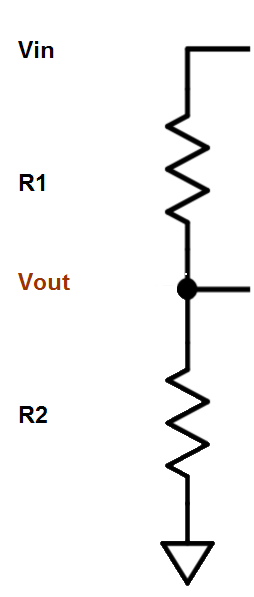Instructions
This utility calculates any one of the four variables involved in a simple two-resistor voltage divider, given values for each of the other three variables. The variables are:
- Vin - The (input) voltage that appears at the top of the divider, measured at the top of R1, with respect to circuit ground.
- R1 - The resistance (in ohms) of the upper resistor
- R2 - The resistance (in ohms) of the lower resistor
- Vout - The voltage that appears at the juncrion of R1 andR2, measured with respect to circuit ground.
Example
Normally, one wants to compute one of the two resistances, given a specified Vin, a desired Vout, and one of the two resistances. In this case, you enter the two voltages and the known resistor and the utility will solve for the unknown resistor
However, consider the following case:
You are troubleshooting a circuit and you find that the Vout of a voltage divider for a 5 Volt Vin, designed with two 10k resistors is only measuring .45V (you expected to see 2.5V).
In this case, you suspect you might have used an incorrect resistor value. You would input one of the designed resistor values, input the two voltages, and solve for the resistor value. Examining the calculated value could suggest that you may have misread a resistor. For example in a voltage divider consisting of two 22.1k resistors to divide 5V to 2.5 V, you find that the output was actually 0.45 V. You think you might have a wrong value for one of the resistors. So, you input the 5V and the 0.45V (as Vin and Vout, respectively), set R1 to the designed 22,100 ohms, and solve for R2, and, Voila! - you get a value of 2,100 ohms for R2, suggesting that you might have mistakenly substituted a 2.21k ohm resistor for a 22.1k resistor!
The Calculator
